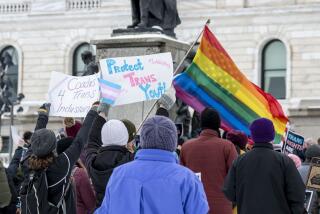Cynthia Nixon says she’s gay by ‘choice.’ Is it really a choice?
- Share via
Former “Sex and the City” star Cynthia Nixon says she is gay by “choice” – a statement that has riled many gay rights activitists who insist that people don’t choose their sexual orientation.
Here’s what Nixon, who recently shaved her head to play a cancer patient in a Broadway production of “Wit,” told the New York Times Magazine:
“I gave a speech recently, an empowerment speech to a gay audience, and it included the line ‘I’ve been straight and I’ve been gay, and gay is better.’ And they tried to get me to change it, because they said it implies that homosexuality can be a choice. And for me, it is a choice. I understand that for many people it’s not, but for me it’s a choice, and you don’t get to define my gayness for me.”
The question of whether sexual orientation is subject to nature or nurture – or some combination of both – has been hotly debated for years. If it is not an immutable characteristic, that would imply that a gay person could be somehow transformed into a straight one. In other words, homosexuality could be “cured.” Which in turn implies that being gay is some sort of illness.
Hence, the offense taken to this point of view.
Nixon seemed to anticipate the controversy her remarks might generate. She also told the New York Times:
“A certain section of our community is very concerned that it not be seen as a choice, because if it’s a choice, then we could opt out. I say it doesn’t matter if we flew here or we swam here, it matters that we are here and we are one group and let us stop trying to make a litmus test for who is considered gay and who is not.” Her face was red and her arms were waving. “As you can tell,” she said, “I am very annoyed about this issue. Why can’t it be a choice? Why is that any less legitimate? It seems we’re just ceding this point to bigots who are demanding it, and I don’t think that they should define the terms of the debate. I also feel like people think I was walking around in a cloud and didn’t realize I was gay, which I find really offensive. I find it offensive to me, but I also find it offensive to all the men I’ve been out with.”
As expected, this did not go over smoothly with everyone. Writing on AmericaBlog Gay, John Aravosis wrote that Nixon “needs to learn how to choose her words better, because she just fell into a right-wing trap, willingly. When the religious right says it’s a choice, they mean you quite literally choose your sexual orientation, you can change it at will, and that’s bull.”
So, what’s the scientific evidence that sexual orientation is either a biologically determined trait or an actual choice?
A Spanish study published in 2009 in the journal Investigacion Clinica summarizes the evidence for genetic influences. Based on research comparing identical twins, fraternal twins and even siblings who were adopted, scientists have determined that 27% to 76% of the chance that one is gay is determined by DNA. The genetic influence appears to be greater for men than for women, according to the study.
Other stuff is probably happening in utero that influences one’s sexual orientation. As a review article published last year in the journal Endocrinology explains, exposure to atypical levels of testosterone and other steroids in the womb is probably responsible for some people being gay. Another review article, published last year in Frontiers in Neuroendocrinology, makes the same point:
“The evidence supports a role for prenatal testosterone exposure in the development of sex-typed interests in childhood, as well as in sexual orientation in later life, at least for some individuals. It appears, however, that other factors, in addition to hormones, play an important role in determining sexual orientation. These factors have not been well-characterized, but possibilities include direct genetic effects, and effects of maternal factors during pregnancy.”
One of those prenatal influences may be the number of males who have previously inhabited the mother’s uterus. It may sound strange, but Canadian researchers have found that “having one or more older brothers boosts the likelihood of a boy growing up to be gay,” as I explained in a 2006 Los Angeles Times story. As I wrote at the time, “The so-called fraternal birth order effect is small: Each older brother increases the chances by 33%. Assuming the base rate of homosexuality among men is 2%, it would take 11 older brothers to give the next son about a 50-50 chance of being gay.” Those findings were reported in Proceedings of the National Academy of Sciences.
In addition, my colleague Shari Roan wrote about a fascinating controversy surrounding treatment for a rare condition called congenital adrenal hyperplasia. The disorder can cause girls to be born with genitals that look male, making it hard to tell the baby’s gender. One treatment is to give women hormones during subsequent pregnancies to reduce the risk for siblings. But doctors have found that this approach has an unusual side effect:
“The treatment might reduce the likelihood that a female with the condition will be homosexual,” Roan wrote. “Further, it seems to increase the chances that she will have what are considered more feminine behavioral traits.”
This is all just the tip of the iceberg. But the scientific consensus seems to be that there is indeed a biological basis for homosexuality – though it’s not necessarily 100% determined by either genes or by environmental factors.
Return to the Booster Shots blog.
More to Read
The biggest entertainment stories
Get our big stories about Hollywood, film, television, music, arts, culture and more right in your inbox as soon as they publish.
You may occasionally receive promotional content from the Los Angeles Times.











